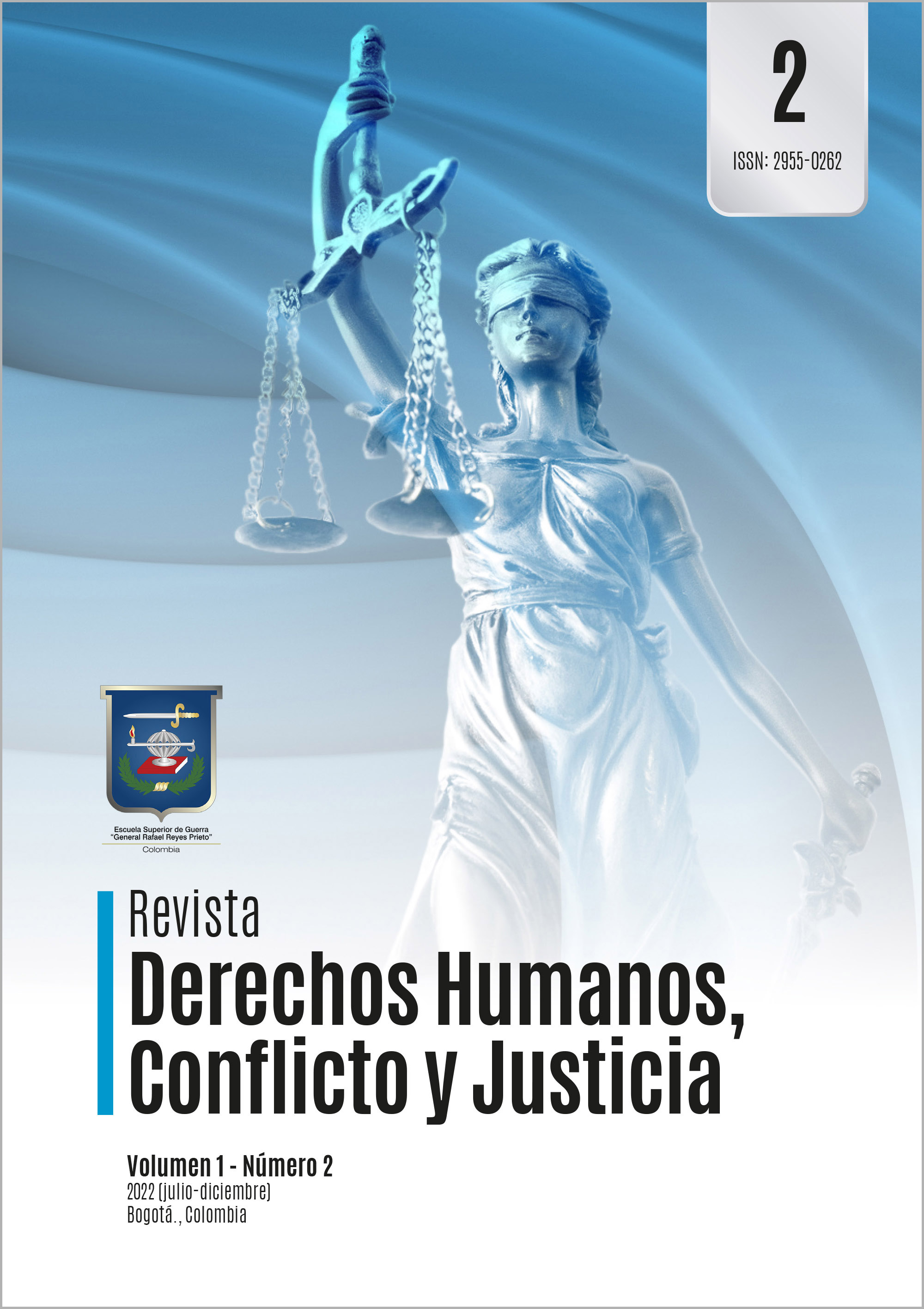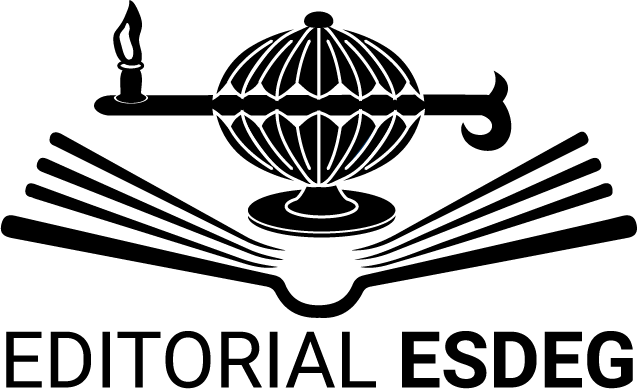Analysis of the historical evolution of the Colombian State from the perspective of the relationship between the Military Forces and civil power in the 20th and 21st centuries
DOI:
https://doi.org/10.25062/2955-0262.4726Keywords:
Historical Evolution, State, Military ForcesAbstract
The historical evolution of the Colombian State in relation to the dynamics between the Military Forces and civil power in the 20th and 21st centuries has been complex and has experienced significant changes over time. During the last century, Colombia went through several moments of political instability and armed conflicts. In this period, a significant intervention of the Military Forces was observed in supporting the country's political system. In the 21st century, Colombia has experienced significant changes in the relationship between the Military Forces and civil power. Considering that the military still has an important role in national security, efforts have been developed to strengthen civilian control over military institutions and promote democracy. Consequently, the existence of a subordination of military power is fundamental for the maintenance of democracy. to the decisions of the civil power.
Author Biography
Guillermo Gómez-Rodríguez, Escuela Superior de Guerra “General Rafael Reyes Prieto”, Bogotá D. C., Colombia
Major of the Colombian National Army. Master of Education, University of Wollongong, Australia. Specialist in Administration of Military Resources for National Defense; and Specialist in Conducting and Administration of Military Units, Military Education Center (CEMIL), Colombia. Professional in Modern Languages, University School of Business Administration (EAN), Colombia. Professional in Military Sciences, “José María Córdova” Cadet School, Colombia.
References
Andrade Becerra, O. D. (2017). Relaciones cívico-militares en Colombia: apuntes para un estado del arte. Revista Análisis Internacional (Cesada a Partir de 2015), 1 (6), 27. https://revistas.utadeo.edu.co/ index.php/RAI/article/view/850
Bernal, G., & Pradere, J. T. (2008). Relevancia de los datos en tiempo real en la estimación de la regla de Taylor para Colombia. Universidad Javeriana-Bogotá.
Echeverría-Acuña, M. A., & Benítez-Hurtado, M. A. (2019). El sistema electoral de la cifra repartidora y la par¬ticipación en política por parte de las Farc en el marco del postconflicto colombiano. Sostenibilidad, Tecnología y Humanismo, 10 (1), 84-95. https://doi.org/10.25213/2216-1872.13
García-Suárez, A. L. (2019). El desarrollo de la democracia colombiana y sus efectos en el binomio Fuerzas Militares-ciudadanía. Revista Científica General José María Córdova, 17 (26), 252-268. https://doi.org/10.21830/19006586.393
Giraldo, J. B. (1986). Algo sobre la constitución de 1886. Revista de la Facultad de Derecho y Ciencias Políticas, (74), 126-135. https://revistas.upb.edu.co/index.php/derecho/article/view/5020
Gómez Albarello, J. G. (2019). La apariencia ‘democrática’de la Constitución de 1991: crisis y futuro de la representación política en Colombia y en el mundo. Análisis político, 32 (96), 103-121. https://revistas.unal.edu.co/index.php/anpol/article/view/83753/73046
Gonzáles, F. (1978). Legislación y comportamiento electorales: Evolución histórica. Revista Controversia, (64). https://doi.org/10.54118/controver.v0i64-65.479
Guarín, R. (2006). Colombia. Oposición, competencia electoral y reformas para la paz en Colombia. Desafíos, 14,69-114. https://revistas.urosario.edu.co/index.php/desafios/article/view/738
Gutiérrez Márquez, M. T. (2014). ‘’Pobres los pobres’’: debates políticos alrededor de la beneficencia en Cundinamarca en 1910 y 1920. Una aproximación desde el Estado colombiano. Historia y sociedad, (26), 121-148. https://revistas.unal.edu.co/index.php/hisysoc/article/view/44391/45688
Herrera, T. C. (2010). Concepciones sobre el Juez Constitucional en la Reforma de 1910: una cuestión de confianza. Diálogos de derecho y política, (3), 68-83.
Huntington, S. P. (2019). The Soldier and the State in the 1970s. In The Changing World of the American Military. Routledge.
Hurtado Mosquera, J. A., & Hinestroza Cuesta, L. (2016). La participación democrática en Colombia: un derecho en evolución. Justicia juris, 12 (2), 59-76. https://doi.org/10.15665/rj.v12i2.1011.
Mazzuca, S., & Robinson, J. A. (2009). Political conflict and power sharing in the origins of modern Colombia. Hispanic American Historical Review, 89 (2), 285-321. https://scholar.harvard.edu/files/jrobinson/files/jr_colombia.pdf
Medina, M. (1991). Obispos, curas y elecciones 1929-1930. Anuario Colombiano de Historia Social y de la Cultura, (18) 185-204.
Mejía, J. V. (2001). Reflexiones críticas sobre la Constitución de 1991. La Constitución por construir: bal¬ance de una decada de cambio institucional, 13.
Muñoz-Ávila, L., & Lozano-Amaya, M. A. (2021). La democracia ambiental y el Acuerdo de Escazú en Colombia a partir de la Constitución Ecológica de 1991. Revista Derecho del Estado, (50), 165-200. https://doi.org/10.18601/01229893.n50.07.
Nieto Ortiz, P. A. (2010). ¿Subordinación o autonomía?: el Ejército Colombiano, su relación política con el gobierno civil y su configuración en la violencia, 1953-1965 (Doctoral dissertation).
Ortiz, R. (2000). Guerrilla y narcotráfico en Colombia. Cuadernos de la Guardia Civil. Revista de Seguridad Pública, 22, 119-132. https://www.ugr.es/~ceas/America%20Latina/Guerrilla%20y%20narcotrafico%20en%20Colombia.pdf
Paredes, Z., & Díaz, N. (2007). Los orígenes del Frente Nacional en Colombia. Presente y pasado. Revista de historia, 12(23), 179-190. http://www.saber.ula.ve/bitstream/handle/123456789/23051/articulo11.pdf;jsessionid=0324A0F8D9AA1899C99A2B002E296E1D?sequence=1
Porch, D. (2008). Preserving autonomy in conflict: Civil-military relations in Colombia. Global Politics of Defense Reform, 127-153.
Rendón, C. M. (2021). Poder militar en América Latina: autonomía o dominación1. CIONISMO, VERD, 143.
Román, L. M. D. (2023). Relación entre Sistema Político y la violencia en Colombia. Universidad y Sociedad, 15(1), 684-696.
Rojas, C. (2009). Securing the state and developing social insecurities: the securitisation of citizen¬ship in contemporary Colombia. Third World Quarterly, 30(1), 227-245. https://www.jstor.org/stable/40388110
Salazar-Gallego, J. (2021). El papel de la justicia comunitaria en el escenario de construcción de paz en Colombia. Revista Derecho del Estado, (50), 323-351. https://doi.org/10.18601/01229893.n50.11.
Villoro, L. (1986). El proceso ideológico de la revolución de independencia (pp. 43-69). México: Secretaría de Educación Pública.
How to Cite
Downloads
Downloads
Published
Issue
Section
License
Copyright (c) 2022 Derechos Humanos, Conflicto y Justicia

This work is licensed under a Creative Commons Attribution-NonCommercial-NoDerivatives 4.0 International License.

















